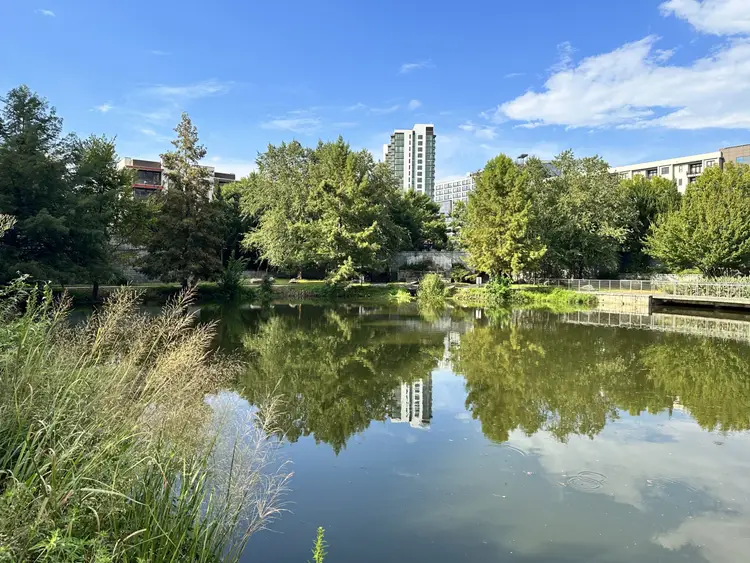Atlanta cracks top 25 in annual ParkScore ranking

Atlanta has earned its highest annual ParkScore yet in 2024, placing 25th out of the 100 largest U.S. cities in the yearly Trust for Public Land park ranking index.
It marks a three-spot jump from last year when Atlanta placed 28th. The city has been on a meteoric rise since 2016 when it placed 51st out of 100.
The annual ParkScore index ranks park systems in the 100 most populous U.S. cities based on five factors: access, equity, acreage, investment and amenities. The ten highest ranked cities in the United States are Washington, DC; Minneapolis, MN; St. Paul, MN; Irvine, CA; Arlington, VA; Seattle, WA; San Francisco, CA; Cincinnati, OH; Portland, OR and Chicago, IL.
Atlanta’s high marks come in part from its park access. 79 percent of residents live within a 10 minute walk of a park, which is five percent higher than the national median. The city also ranks high in park spending: at $249 per capita it invests double the national average.
Trust for Public Land Georgia State Director and Southern Region Vice President George Dusenbury said the score will make Atlanta’s continued growth viable.
“Atlanta continues to be one of the most vibrant cities in America, and I think its improvement in the ParkScore tracks its attractiveness as a place for people to come live, “Dusenbury said.
Park Pride Executive Director Michael Halicki said he is “thrilled” with the ranking, but it’s “not time to take our foot off the gas.” As the leader of the citywide nonprofit dedicated to improving parks, he used the annual score to ask for a $51.8 million fiscal year 2025 budget, a multi-million increase from last year for the Department of Parks and Recreation.
“We must continue to rise and to push ourselves for the best we can be in delivering a world-class park system,” Halicki said. “We should do this for our region’s economic competitiveness, attracting top talent and capital to our city; we should do this for our residents; we should do this for the generation to come.”
Halicki pointed out that while Atlanta ranks high in certain areas, it has “room to grow” in others, like equity and acreage. He also said the 100/100 ranking for investment is great but is owed in part to significant philanthropic contributions.
About 21 percent of Atlanta parks investment is owed to private donations, compared to a five percent national average. Halicki said the trust has changed its ranking methodology in recent years – before, the organization did not count philanthropic contributions and Atlanta sat at 51 out of 100.
Atlanta raised taxes in 2023 to dedicate more funds to park maintenance, though – a move that increased funds by $10-12 million.
He also pointed to Atlanta’s lower-ranking categories, namely equity and acreage. Only six percent of the city’s land has been dedicated to parks, and the 457 existing parks have a median size of 2.9 acres compared to the national average of 5.4.
Dusenbury said the biggest opportunity for improvement is the quantity of park land, and he hopes that the city’s continued land dedication will solve it. The city is about to reach 5,000 acres of park land by this year, and Atlanta Mayor Andre Dickens aims to get the number to 7,000 by 2030.
Dusenbury also hopes to see more collaboration with the parks. He hopes to continue the nationwide Park Pride initiative Community School Yards in Atlanta, which would have school parks serve as educational spaces during the day but become community recreational spaces during non-school hours.
So far, the city has eight community schoolyards and another six in the works.
With the release of the annual ParkScore, park leaders are already looking toward improvements in the coming year.
“The alignment of parks and equity is our mandate from this study,” Halicki said.
Executive director Halicki also said he would like to incorporate more robust amenities into the existing parks. Atlanta ranked 60 out of 100 in the ParkScore index. Halicki said that when Atlanta residents were surveyed for the 2022 park master plan, one of the top requests was for public bathrooms.
“Bathrooms are one of those things everybody wants, but nobody wants to talk about,” Halicki said.
He also pointed to more “creative ideas” to create resilient parks in different Atlanta communities, like splash pads and water features to combat extreme heat. He hopes the ParkScoore will promote a focus on equity, acreage and resilience.
“There’s a lot of great ideas that this helps to bolster,” Halicki said.
Alongside the annual ratings list, the Trust for Public Land published new research called “The Power of Parks to Strengthen Community.” Using 900 examples from city leaders across the country, the trust found that residents of cities ranking in the top quarter of the index are 60 percent more likely to volunteer than residents of lower-ranking cities. Higher-ranking city residents are also 26 percent more likely to form friendships with people in different socio-economic groups.
“Park leaders are stepping up to promote community connection and address the national epidemic of loneliness and social isolation,” President and CEO of the Trust for Public Land Diane Regas said.











































